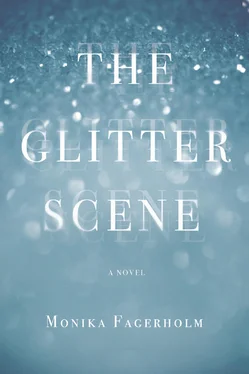And Tobias was away during these weeks. Sometimes I have thought that things could have been different if Tobias had been there. With his swimming ability, for example. Or just because.
And among everything that is falling apart, cracks, there is always something else. Something just as meaningful, maybe more meaningful, even if you don’t see it right away. With Tobias, for example, when he comes back in a few days and finds out everything. He comes to me and Rita in the cottage, like before. We don’t hug each other or anything. It is never like that with Tobias. But he, in some way, without a lot of fuss and big gestures, without words, walks beside us.
For me it is enough. I’m here. Even more.
•
But it was Rita who was there and saw everything and has to tell Doris a little lie. The American girl who ran out onto Lore Cliff, the cousin’s mama after her, and the American girl couldn’t get any farther.
The cousin’s mama on the cliff who remained standing there. Doris up onto the cliff to the cousin’s mama, but the cousin’s mama had already run away. On the cliff, Doris who was standing and screaming, blue, in my bathing suit, as if she were Sister Blue.
And turned and ran after the cousin’s mama.
Rita alone, who came home.
Told Doris Flinkenberg that it was a game, “she came up again later.” You can believe that sort of thing if you want to, if you’re young and a child.
Even if it still doesn’t leave you, it remains there. Is that why Doris needs to drag her new friend Sandra Wärn from the house in the darker part into it a few years later? Into the story? Start over again, “find out.”
Possibly. I don’t know.
But we lied to Doris, everyone lied to Doris, it was never written down on paper like an agreement.
The cousin’s mama, the “children’s mama,” who really didn’t know what she had done. But then there was also Björn.
She stayed with us.
And we, all of us, wanted it that way.
•
But later, when Doris grew up and was unhappy, then she wanted to know how things had been. So. Asked Rita. Rita had to answer.
In any case: in the newspaper much later when I take care of the cousin’s papa alone and am cleaning up in the kitchen, find in a cabinet, a newspaper from the fall Doris died, there is a crossword puzzle, half finished. There is a last name in the row where the correct word is supposed to be filled in: “Astrid a pop song for the day.” And it is the idea that you’re supposed to fill in the surname of the singer who had sung that song some time during the ’60s I guess it was. “A song for the day.”
I don’t remember that song. Doesn’t mean anything to me.
But it is the name, Astrid. And after the name, in straggling angry teenage letters there is a long word that doesn’t fit in the boxes following it, there are only four of them. Letters on top of each other, a terrible word, I’m not going to say it, but something with m.
•
I never showed it to the cousin’s mama when I went and visited her, she was living in the neighboring municipality back then. I threw the paper away. I forgot. And have forgotten.
•
“The folk song has many verses, the same thing happens in every one, over and over again, an eternal repetition of time and space. Such a different way of looking at time.”
Doris Flinkenberg who is singing folk songs on an old cassette tape, talking about the folk songs between the songs. “And the girl she walks in the dance with red, golden ribbons”; “I went out one evening, out into a grove so green”—those kinds of songs, others like them.
I used to play the old cassette in the company car sometimes. Susette, my colleague who was sleeping next to me, in the morning. I turned up the volume so she would wake up, sometimes just the news and especially the weather forecast; a morning sleepy person who otherwise could sleep almost anywhere, standing, and sitting then, in the company car.
I don’t know if I liked those songs Doris sang, in some way it already felt so big, bewitching, exaggerated. But you could of course also see them as Doris’s message to all of us who would be left behind and live on after her too. I don’t know. I didn’t think about that then, at least. Rather mostly that they could still in some way carry me back to certain memories that I had from when it was still so beautiful in some way, but not in the way that you wanted to talk about it anyway.
Or maybe to muffle a bad conscience because I was never able to like Doris Flinkenberg. I don’t know.
In any case. After Bengt’s death I stopped playing that cassette almost completely. That simple. Just turned it off.
Turned the radio to the morning news and the weather forecast instead. The sea level, all of the lighthouses. Bulleholm southwest eighteen . But for a while it only made me sad. I came to think about Susette, my colleague Susette, and missed her. Susette, who in order to show me how awake she still was in the morningcar even though it looked like she was sleeping, would start rattling off those reports in the middle of the workday too. Idiotic. But also charming, a bit.
Started thinking about what became of her. Here for a while, then gone. I’ve never been angry at her exactly, definitely not, but I thought that it would have been nice to hear from her, that she could have been in touch, sent a card, the like. On the other hand, of course, we were colleagues, had our own separate lives, we didn’t know each other.
And then I closed the cleaning business, sold it to Jeanette Lindström, who naturally, when her entire “imperium,” which she called it in her prime, fell in connection with the recession at the beginning of the nineties, drove it into bankruptcy. Four Mops and a Dustpan; but shall I grieve , as Doris sings, I had already started my real estate business instead at that time. And Irene was there and Johanna—all of us living in the newly built house below the hill on the First Cape. Tobias came by a lot, it was a new life, a different life, a good life. And nothing more about that here, now.
•
But Rita and I, still on this morning. The moment before I get a red towel thrown in my face—but I don’t care so much about that, I know Rita, her anger too, her fear too, her still, like my own, smallness.
Sun cats that reflect in the room, like a dance. I stand there where they are dancing over my body, warm beams, here in the room, it is warm.
Rita and I, Bule Marsh in my head, like an image.
The beaches at the marsh: root ends winding around each other. But you see that only when the sand around them has washed away, which will happen in the time to come, gradually. When the sandy beach washes away, it wasn’t natural either, transported there. Heavy, thick roots, with large knots, which are hiding underneath, and in the reediness.
That image can’t really be explained. But it exists. Has an effect on you, always.
And we won’t become swimmers, Rita and I.
•
I drive home. I have been at exhibitions, looked at a few new objects in another part of the District. It is the month of November 2006, in the evening, late, maybe already night. There has been a fire at the Winter Garden, fire trucks pass me on the road. You don’t see much of the fire, it has already been put out. The darkness suddenly falls now and it’s only when I drive past Tobias’s old greenhouse on the side of the road that it hits me that it’s due to the fact that the lights from the Winter Garden aren’t on, the fire that has been neither large nor destructive seems to have taken out the lighting, goodness knows what it’s good for: the Winter Garden, I have never been there.
Читать дальше











